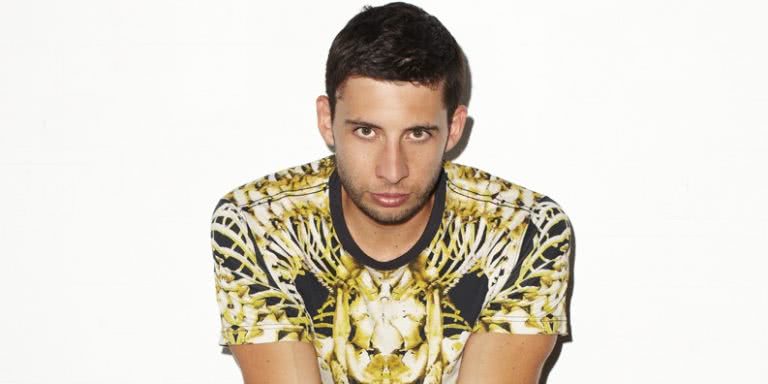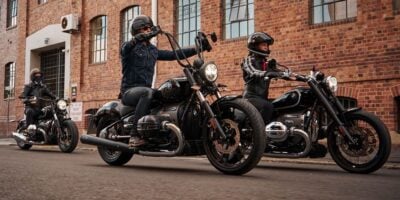Behaviour at dance music festivals can range from tasteful to downright barbaric, but no matter the atmosphere, you’re certain to encounter vigorous bodily movement. Often, however, the amount of physical activity onstage is fairly limited. While blasting beats, flashing lights and video imagery create an illusion of chaos, there’s no escaping the fact many electronic musicians don’t put a lot into their performance.
This won’t be case, however, when Example takes the stage at this year’s Future Music Festival. Example is the solo moniker of London’s Elliot Gleave, but onstage Example becomes a five-piece band.
“[There are] drums, guitar, bass and keyboards and then we run laptops on the side as well,” says Gleave. “I think it’s important to do, because there’s not many live dance acts about. Recently, it’s been me, Chase & Status and Rudimental, but no-one else is really doing the live thing. There’s people who’ve got a live show, but it’s essentially keyboards, laptops and lights.”
In mid-2014, Example released his fifth record, Live Life Living. Following in the footsteps of its two predecessors – 2012’s The Evolution Of Man and 2011’s Playing In The Shadows – the record features slick, radio-friendly production. Example’s recorded output might get increasingly refined as his career progresses, but the live shows remain a raucous affair.
“[I set out to] put on an amazing live experience,” he says. “It’s about moshpits and hands in the air and girls on shoulders and tonnes of clapping and screaming and shouting and bouncing up and down, so by the time you leave after about an hour your eyes hurt, your ears hurt, your legs hurt, you’ve lost your voice. It’s kind of like bringing that punk rock/metal attitude to popular dance music.
“It’s been really fun to explore that and change it over the years,” he adds. “People might hear ‘Kickstarts’ on the radio – a fun, bouncy electropop song – and then see it live and it’s got rock elements to it and the whole electro elements to it and it’s quite an aggressive performance of what is essentially a pop love song. That’s helped us to take on a whole new meaning live to people.”
While Gleave’s hard-hitting, full-band performances divert from the contemporary dance music norm, his decision to work with live musicians isn’t simply a way to distinguish himself from the pack. Rather, this approach is modelled after what he considers the glory days of live electronic music.
“Back in the ’90s, when you had Basement Jaxx and Prodigy and Faithless and Leftfield – the list is endless,” he says. “There was like ten or 15 amazing live dance acts, especially out of the UK. People have forgotten that dance music for ten to 20 years was a live experience. It wasn’t just a guy on decks.”
Despite his nostalgic leaning, one of Gleave’s primary influences is an act from the 21st century. “I think Pendulum did an amazing job as well,” he says. “It was an electronic kit and there was a lot of stuff going on backing tracks as well, but I think those guys and The Prodigy were the models for us in terms of how good we wanted it to look and sound.”
The added movement and enhanced aural dynamics provided by a full band make it a stimulating occasion for punters and performers alike. In addition to his aesthetic allegiance, Gleave relishes the chance to let loose onstage, as his touring schedule is otherwise fairly regimented.
“You might land somewhere at 4pm, go straight to the hotel, have a shower, do two hours of interviews, have a few beers, perform, offstage at 1am, back to the hotel for two hours’ sleep, wake up at 4am and then you’re on a flight somewhere else. It’s all very cool saying, ‘I went to Serbia and Hungary and then Dublin and Czech Republic in one weekend,’ but you probably spent like seven, eight hours there, didn’t really get much sleep and didn’t really see anything of interest apart from the crowd.”
Along with the emphasis on pop-centric production features, rapping has gradually become less prominent on Example records. Notably, Live Life Living is the first LP where his rapping is altogether absent. Gleave has long proved capable of penning a dancefloor anthem – major examples include ‘Changed The Way You Kiss Me’ and ‘One More Day’ – but his willingness to take on greater melodic responsibility doesn’t mean he’s gunning for the title of pop music’s pre-eminent vocalist.
“I didn’t even have the confidence to sing at the start,” he says. “People would meet me – world-class producers – and say, ‘Look, your voice is like Marmite; some people are going to love it, some people are going to hate it.’ Once I realised I was going to be that kind of artist and not be an Adele or an Ed Sheeran where everyone’s like, ‘Fuck, their voices are amazing,’ I got the confidence to sing more and write songs. Then the whole thing’s been an evolution.”
This hint of self-deprecation aside, Gleave has always felt at home in a performance setting. “When I was a kid I was always cocky and loud and attention-seeking, but I wasn’t one of the popular kids. I was an awkward teenager with a bit of a funny-looking face. When I was put onstage, from a young age, that’s when I became alive. I became myself.”
Catch him at Future Music Festival 2015alongsideDrake, Avicii, The Prodigy, Afrojack, Martin Garrix and many more atRoyal Randwick RacecourseonSaturday February 28, tickets online.Live Life Living out now throughSony.


































